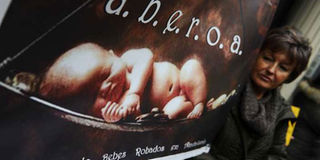Maraga to receive report on abuse of adoption process

A woman stands next to a sign with a message that is anti-children trafficking. A report set to be given to Chief Justice David Maraga has chillingly confirmed that there is rampant child trafficking in Kenya. PHOTO | AFP
What you need to know:
- Out of five cases that were going on in court, DNA conducted on four of the children confirmed links to their existing parents.
- CS Yatani said the United Nations had once again cited Kenya as one of the countries that encourages child trafficking.
- Mr Yatani said the Children’s Act, 2001 was being reviewed and a Bill is currently at the Attorney-General’s office.
A report showing how the process of adoption is being abused to facilitate child trafficking is set to be handed over to Chief Justice David Maraga.
A joint meeting between the CJ and Cabinet Secretary for Labour and Social Protection Ukur Yatani last week agreed that the report be handed over to the Judiciary for review.
It raises serious questions regarding the handling of child adoption cases in the country.
RAMPANT TRAFFICKING
The report of the seven-member team comprising child experts chillingly confirms that there is rampant child trafficking happening, including stealing, laundering and procurement.
The debate on the issue of adoption is being stepped up ahead of an International Children Protection Conference to be held in Nairobi from August 8 to 10, sponsored by the Directorate of Children Services under the Labour and Social Protection Ministry.
The conference programme shows that issues of adoption and protection are among the major items to be discussed at the event to take place at Daystar University.
ILLEGAL ADOPTIONS
According to the report to be handed over to Mr Maraga, out of five cases that were going on in court, DNA conducted on four of the children confirmed links to their existing parents, yet the babies had been offered for adoption.
“These five children had parents looking for them and yet they were given out to foreigners and a local family,” says the report dated December 2017.
It adds: “These were the cases that were obvious and had overwhelming evidence; otherwise there are many others full of malpractices that the committee is following up.”
The work followed the government’s moratorium on intercountry child adoption on November 2014, after reports that adoption and other forms of alternative family care for children had been used by unscrupulous agencies and officials to traffic children.
CORRUPTION
At the meeting held at the CJ’s office, Mr Yatani said the moratorium was aimed at taking care of the welfare of the child, since in adoption, at times money changes hands among corrupt players.
The CJ was briefed on what the ministry, through the Department of Children’s Services, was doing on the ongoing international adoption matters in light of the moratorium imposed by the Cabinet.
He asked to be informed of the measures that had been put in place to ensure that foreigners do not circumvent the adoption process.
Justice Maraga clarified that apart from the magistrates’ court, which handles the bulk of the children’s cases, the High Court only deals with adoption and succession matters that involve children.
The CJ said that they usually conduct a rapid results initiative (RRI) service week during which the magistrates visit courts with a backlog of children matters and fast track them in collaboration with the children’s officers.
REMAND HOMES
He noted that the country lacks adequate prison facilities since the existing ones were built during the colonial times. Children remand homes are equally overstretched and lack adequate facilities.
The CJ noted that due to inadequate facilitation of remand homes, children are not taken to courts promptly hence a backlog in cases.
The children thus end up overstaying in the homes. He noted that the budgetary allocation to the remand homes should be increased.
The CJ said there is a mismatch between the population and the number of officers and resources available for Judiciary to execute its mandate effectively.
Mr Maraga advised the CS and his team to identify and put down their concerns in writing and give them to the Chief Registrar and he will address them during the annual conference for Judges and Magistrates.
LAW REVIEW
The Bill makes adoption a rigorous exercise and proper vetting will be done to the prospective adoptive parents.
The CJ wondered what will happen to international adoption cases that had started before the moratorium was placed yet Kenya is still a signatory to the Hague Convention on Intercountry adoption.
The CS said the United Nations had once again cited Kenya as one of the countries that encourages child trafficking.
“The CS should give a list of all the international adoption cases that had started before the moratorium was put in place,” a report of the meeting said.
“This way, the Judiciary will be able to advise the taskforce on children’s matters to look at each case individually.”
Justice Maraga requested to be given a list of the number of child offenders in all the remand homes countrywide whose cases have overstayed for more than three years for direction.
He also proposed that children’s officers be trained by the Judiciary on judicial procedures.





